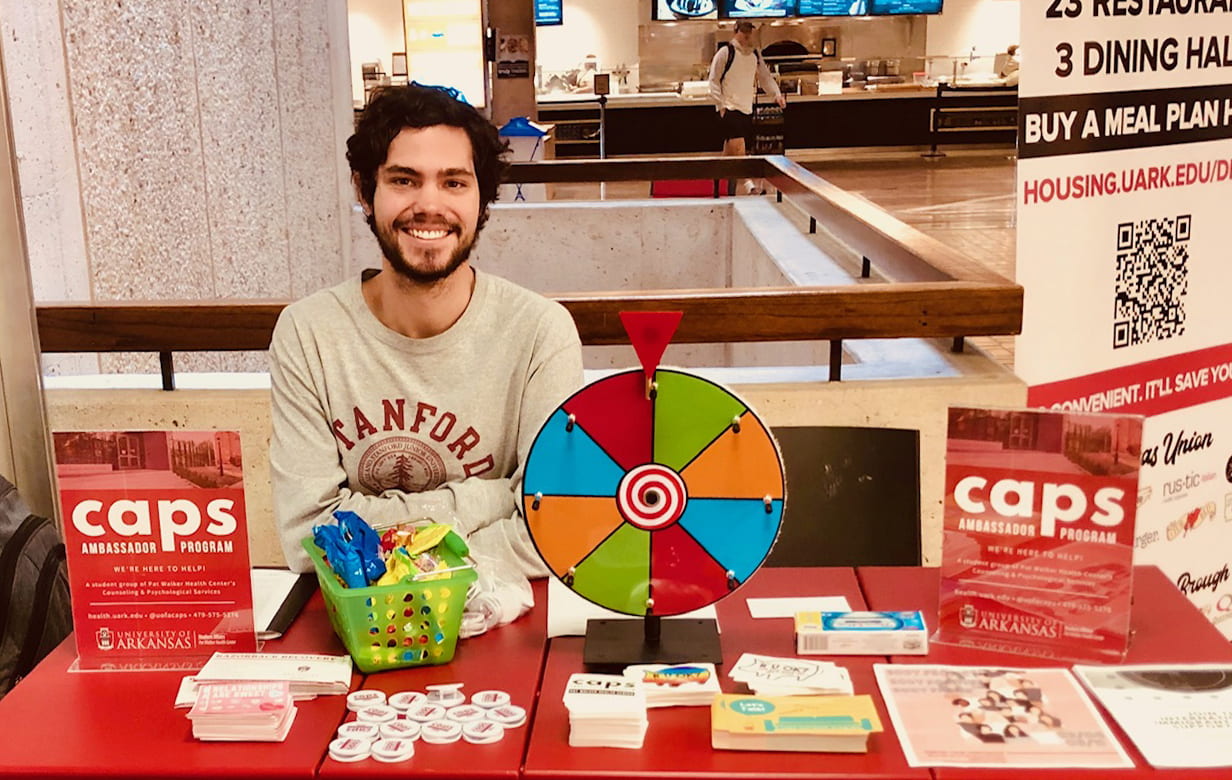
Higher education continues to face the growing reality that more college students are coming to campus with mental health concerns.
As universities become increasingly more aware of the importance mental health has on the success of a student, college counseling centers have had to become more creative in the ways they engage with students.
The University of Arkansas is no different.
Year-after-year, Pat Walker Health Center’s Counseling & Psychological Services (CAPS) has made tremendous strides making mental health a major priority for the U of A community. Through evidence-based mental health services and programs, CAPS successfully meets the academic, developmental, remedial and preventive needs of the campus community.
Having a comprehensive, state-of-the-art campus counseling center is vital to creating a campus climate that values mental health care. But it’s just the start. As challenges continue to evolve, so does the campus’ efforts.
It Takes A Village
 When it comes to mental health, everyone is responsible. This is why CAPS has consistently focused on strengthening relationships within the campus community, drilling the cliché that it truly ‘Takes a Village’.
When it comes to mental health, everyone is responsible. This is why CAPS has consistently focused on strengthening relationships within the campus community, drilling the cliché that it truly ‘Takes a Village’.
The phrase couldn’t be more accurate in describing the strides the Division of Student Affairs has made to create a culture of support.
All across the Division, staff have responded by taking up action and finding ways to incorporate mental health awareness within their specific units, programs and offices.
Whether it is learning and detecting warning signs of distress, helping create mental health care access points, or simply trying to decrease the stigma associated with getting help — every action has led to a coordinated effort to build a positive, supportive campus culture.
However, the efforts within the Division of Student Affairs isn’t enough by itself either. In order for these networks of support to thrive and sustain, students must champion the efforts with peer-to-peer support as well.
The Power of Peers
Over the years, CAPS has steadily ramped up outreach and awareness efforts as a way to help students beyond the walls of the traditional counseling center. While programs and events like Let’s Talk and Play Day are embraced by students, an element has been missing — peer educators.
Leveraging students as source of support for other students isn’t a new, ground-breaking idea. In fact, with regard to mental health, the U of A is fortunate to already have several student groups actively promoting mental health.
The influence college students have on each other can be a powerful force that benefit several areas of a student’s life including learning, attitudes and behaviors.
Recent research studies have found that peer-to-peer engagement that focus on mental health awareness can improve college students’ knowledge about mental health, reduce stigma, and play an important role in improving the campus climate toward mental health.
Regardless, CAPS has never had direct student liaisons focusing on addressing stigma and empowering students in a more personal way. But, as of this semester that has changed.
CAPS Ambassador Program
The CAPS Ambassador Program is an undergraduate outreach program aimed at reducing the stigma often associated with seeking help for emotional or psychological problems. Although ambassadors are limited in the types of services they provide, ambassadors offer an additional access point to getting connected with mental health services at CAPS.
“It’s one thing to see someone from CAPS performing outreach on campus, students can feel hesitant to come up and engage,” said Stephanie Steele-Wren, Psy.D, CAPS psychologist and ambassador program coordinator. “An ambassador program not only creates more, accurate awareness of mental health services, but also seamlessly fits with the long-term vision and care matching model for CAPS”
Even as a brand-new program, CAPS is already seeing the drive and dedication of students wanting to help their fellow students. With over 40 student applicants in its first semester, the program has a bright future ahead.
By adding a student-led education program, CAPS, Pat Walker Health Center and the Division of Student Affairs can continue to be more effective at changing behaviors, attitudes and norms, all the while providing the best opportunity for students to succeed academically and personally.
“Ambassadors are out on campus, in classrooms, Greek Life Chapters, tabling in the Union, engaging on social media, planning events, and recognizing what mental health concerns are currently affecting their friends and peers,” said Steele-Wren. “Having student liaisons out doing peer outreach gives other students someone they can relate to more. This helps reach more students on campus and in an even more welcoming way.”

Meet a CAPS Ambassador!
Noah Hill, Junior, Psychology Major
Why did you become a CAPS ambassador?
I became a CAPS ambassador because I know how prevalent anxiety and depression are among college-aged students. When applying to be an ambassador, I quickly realized how valuable this program could be in combating the mental suffering of students on campus by informing them of all the wonderful resources and benefits included when seeking relief at CAPS.
How do you see this program and your efforts benefitting students?
My experiences tabling(outreaching) in the union for CAPS have made it clear that students are very much unaware of CAPS in general and especially what support students can get out of coming in to CAPS. Just being aware of CAPS and its benefits is a step in the right direction for students who may find themselves or their friends seeking help with their mental health.
What do you think is the benefit of peer-to-peer outreach and support?
Ambassadors are students themselves, so we know exactly what it is like to be a student on this campus and can relate our experiences with other students’ experiences much more fluidly. We can empathize better with our peers and know what level of understanding students have about university resources.
Why do you feel it is important that the Division of Student Affairs, which includes CAPS and other student programs/resources, support mental health initiatives?
With the extreme prevalence of anxiety and depression among college students, it is paramount that all students are aware that there is no reason to have to continue struggling with your mental health when the campus has a myriad of wonderful remedies and resources that can help dramatically with the plights of a college student.
What role do students have when it comes to mental health and creating a safe, supportive campus environment?
One major adversary of anxiety and depression is having a supportive group of friends around you that let you share your emotions and struggles openly and encourage you whenever possible. Having a solid group of peers that you can go to no matter the reason or time of day builds an environment of feeling safe, supported, and healthy.
Any additional thoughts?
If anyone reading this is struggling with any mental issue, please check out the CAPS website and Instagram page @uofacaps for information on how to take the next step towards healing.
https://health.uark.edu/mental-health/ambassadors.php
To learn more about CAPS and the many mental health programs and services, go to health.uark.edu.
